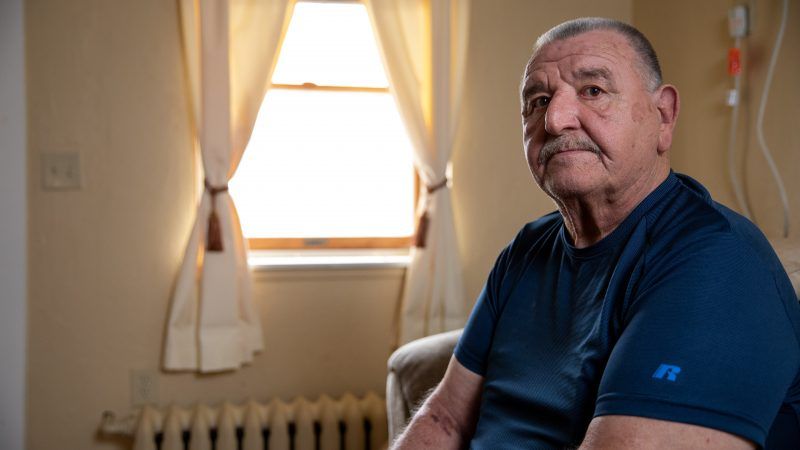Family Sues DEA and TSA After Elderly Man's Life Savings Were Seized at Airport
A class-action lawsuit is now challenging the DEA's habit of seizing large amounts of cash from travelers without evidence of any crime.

Terrence Rolin kept his life savings in a Tupperware container, but all that money now belongs to the Drug Enforcement Administration (DEA), even though the 79-year-old retired railroad engineer hasn't been charged with a crime.
When Rolin's daughter, Rebecca Brown, tried to take her fathers' savings—$82,373 in cash—on an airplane, a DEA agent seized it simply because large amounts of cash are considered suspicious by the agency.
Brown and Rolin are now the lead plaintiffs in a federal class-action lawsuit filed Wednesday by the Institute for Justice, a libertarian-leaning public interest law firm, challenging the DEA and TSA's practice of seizing large amounts of cash from airline passengers without any evidence of any underlying crime.
"Flying with any amount of cash is completely legal, but once again we see government agents treating American citizens like criminals," Institute for Justice senior attorney Dan Alban said in a press release. "You don't forfeit your constitutional rights when you try to board an airplane. It is time for TSA and federal law enforcement to stop seizing cash from travelers simply because the government considers certain amounts of cash 'suspicious.'"
Rolin and Brown's trouble started last August. Rolin had asked his daughter to take his money and open a joint savings account, the Washington Post reports:
Rebecca Brown was catching a flight home from the Pittsburgh airport early the next day and said she didn't have time to stop at a bank. She confirmed on a government website that it's legal to carry any amount of cash on a domestic flight and tucked the money in her carry-on.
But just minutes before departure in late August, a Drug Enforcement Administration agent met her at the busy gate and questioned her about the cash, which showed up on a security scan. He insisted Brown put Rolin on the phone to confirm her story. Brown said Rolin, who is suffering mental decline, was unable to verify some details.
"He just handed me the phone and said, 'Your stories don't match,'" Brown recalled the agent saying. "'We're seizing the cash.'"
The DEA then notified Brown that it was seeking to permanently forfeit Rolin's life savings. Neither Rolin or Brown have been charged with a crime.
In the meantime, the lawsuit says the loss of Rolin's savings has left him unable to fix his truck, which is his primary means of transportation, or get needed dental work.
"My father and his parents worked hard for this money, and the government shouldn't be able to reach into his pocket and take it," Brown said a press release. "We did nothing wrong and haven't been charged with any crime, yet the DEA is trying to take my father's life savings. His savings should be returned right away, and the government should stop taking money from Americans who are doing something completely legal."
In cases like Brown's, the DEA seizes cash using civil asset forfeiture, a practice that allows police to seize cash and property suspected of being connected to criminal activity, even if the owner is not charged with a crime.
Federal, state, and local law enforcement seize millions of dollars in cash every year in drug interdiction operations, much of being transported along highways and through airports. In 2016, a USA Today investigation found the DEA seized more than $209 million from at least 5,200 travelers in 15 major airports over the previous decade.
Police groups say civil forfeiture is a vital tool that allows them to disrupt drug trafficking by targeting its illicit proceeds.
However, civil liberties groups say there are few safeguards to protect innocent owners, who bear the burden of challenging the seizure to get their property back.
The Institute for Justice lawsuit claims the DEA has a practice or policy of seizing currency from travelers at U.S. airports without probable cause simply if the dollar amount is greater than $5,000. This practice, the suit argues, violates travelers' Fourth Amendment rights.
In 2016, Reason profiled the case of Charles Clarke, a college student who was robbed of $11,000 dollars at the Cincinnati/Northern Kentucky International Airport by a local police officer who was deputized by the DEA. The officer claimed Clarke's suitcase smelled like marijuana, although no drugs were found in it. Clarke, helped by the Institute for Justice, got his money back in an agreement with the Justice Department.
A 2017 report by the Justice Department Inspector General found that the DEA seized more than $4 billion in cash from people suspected of drug activity over the previous decade, but $3.2 billion of those seizures were never connected to any criminal charges.
The report reviewed 100 cash seizures and found that only 44 of those were connected to or advanced a criminal investigation. The majority of seizures occurred in airports, train stations, and bus terminals, where the DEA regularly snoops on travel records and maintains a network of travel industry employees who act as confidential informants.
A 2016 Justice Department Inspector General report chastised the DEA for recruiting a TSA screener as an informant and promising the screener a cut of the proceeds from forfeited cash that he discovered.
A DEA spokesperson, per the agency's policy, declined to comment on ongoing litigation.


Show Comments (89)